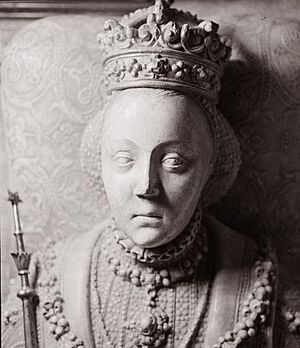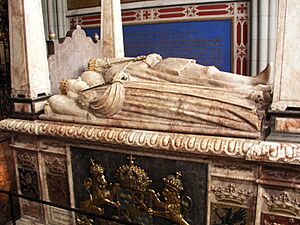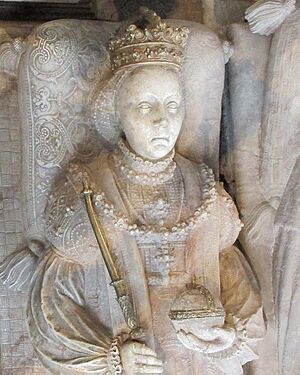Catherine of Saxe-Lauenburg facts for kids
Quick facts for kids Catherine of Saxe-Lauenburg |
|
|---|---|

Catherine as depicted on her tomb
|
|
| Queen consort of Sweden | |
| Tenure | 24 September 1531 – 23 September 1535 |
| Born | 24 September 1513 Ratzeburg |
| Died | 23 September 1535 (aged 21) Stockholm |
| Burial | Uppsala Cathedral |
| Spouse | Gustav I of Sweden |
| Issue | Eric XIV of Sweden |
| House | Ascania |
| Father | Magnus I, Duke of Saxe-Lauenburg |
| Mother | Catherine of Brunswick-Lüneburg |
| Religion | Lutheran |
Catherine of Saxe-Lauenburg (born September 24, 1513 – died September 23, 1535) was the first wife of Gustav I of Sweden. This made her the Queen of Sweden from 1531 until her death in 1535. In Swedish, her name was Katarina.
Early Life and Marriage Plans
Catherine was born in Ratzeburg. Her parents were Magnus I, Duke of Saxe-Lauenburg and Catherine of Brunswick-Lüneburg.
Her marriage to Gustav I of Sweden was arranged for political reasons. Gustav had just become king of Sweden and wanted to marry quickly. He had tried to marry other princesses, but those plans did not work out. Finally, he was advised to consider the Duchy of Saxe-Lauenburg.
Even though the duchy was small, it had many benefits. Its royal family was connected to powerful families across Europe. This was important for Gustav, as it would give him valuable connections with German princes. The duchy was also Protestant, which was good for the ongoing Swedish Reformation. It also had a link to Denmark, as Catherine's older sister, Dorothea of Saxe-Lauenburg, was married to the Danish Crown Prince.
Negotiations for the marriage began in 1528. They took several years because Catherine's father was unsure if Gustav's rule in Sweden was stable. However, with help from the city of Lübeck, the marriage plans were completed. Catherine was promised the counties of Korsholm, Kalmar, and Öland as a gift.
Queen of Sweden
In September 1531, Catherine traveled to Sweden by ship. She was escorted by important Swedish nobles, including her future sister-in-law, Margaret. Catherine met her future husband, King Gustav, for the first time then. Their wedding took place in Stockholm on September 24, 1531, which was also Catherine's 18th birthday.
Soon after the royal wedding, King Gustav and Queen Catherine hosted other important events. These included the wedding of Brita Leijonhufvud to Gustav Olsson Stenbock. Brita Leijonhufvud was the daughter of the king's cousin. She would later become the mother of the king's third wife, Catherine Stenbock. The king's niece, Brita Joakimsdotter Brahe, also became engaged. These were the first events Catherine hosted as Queen of Sweden.
Not much is known about Queen Catherine's personality or her time as queen. We don't have much information about her personal staff. However, it is thought she brought ladies-in-waiting from Germany. She also had Swedish ladies-in-waiting, and Margaret Leijonhufvud (who would become the king's second queen) was likely one of them.
Some historical stories describe Catherine as moody, cold, and unhappy. They say her marriage was difficult. However, there are no records from that time that confirm this. On December 13, 1533, Queen Catherine gave birth to a son, Eric XIV of Sweden. This was her most important duty as queen, as he would become the next king.
Death
In September 1535, Queen Catherine was pregnant. During a ball held for her brother-in-law, King Christian III of Denmark, she fell while dancing. This fall caused her to be confined to bed. She died on September 23, 1535, along with her unborn child.
At the time of her death, King Gustav was involved in a conflict called the Count's Feud. His enemies spread a rumor that he had killed Queen Catherine. They claimed he hit her on the head with a silver cane. However, when Catherine's skeleton was examined in the 1940s, there was no sign of such an injury. Also, her family never accused the king. King Christian III of Denmark, who was present, confirmed in his own letters that Queen Catherine had a serious fall.
In many older history books, Queen Catherine was given a bad reputation. She was often shown as a poor example, especially when compared to Gustav I's second queen, Margaret, who was often described as a perfect queen.
See also
 In Spanish: Catalina de Sajonia-Lauenburgo para niños
In Spanish: Catalina de Sajonia-Lauenburgo para niños
 | Georgia Louise Harris Brown |
 | Julian Abele |
 | Norma Merrick Sklarek |
 | William Sidney Pittman |



